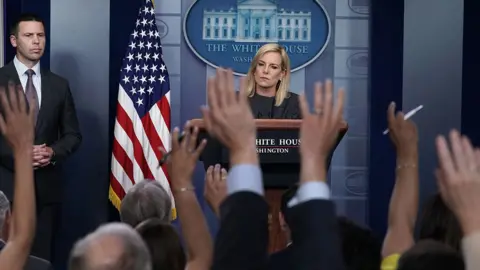A series of White House contradictions on migrants
 Getty Images
Getty ImagesThe White House has struggled to get its message clear on its controversial policy of removing children from migrant parents after crossing the US border illegally.
So what has been said on this?

'We are thinking about separating families'
March 2017
Reports of the new policy first emerged in March 2017, and the homeland security secretary at the time, John Kelly, was asked whether he was seriously considering it.
"Yes, I am considering in order to deter more movement along this terribly dangerous network ... I am considering exactly that."
Allow X content?

'We have a new policy and your child may be separated from you'
7 May 2018
Attorney General Jeff Sessions announces the new zero-tolerance policy that all border-crossers will be prosecuted.
"If you cross the border unlawfully then we will prosecute you... if you are smuggling a child then we will prosecute you and that child may be separated from you as required by law."


'It's a deterrent'
11 May
White House Chief of Staff John Kelly tells NPR the zero-tolerance policy is to warn others not to come.
"They're not bad people. They're coming here for a reason. And I sympathise with the reason. But the laws are the laws. But a big name of the game is deterrence.
"The children will be taken care of - put into foster care or whatever. But the big point is they elected to come illegally into the United States and this is a technique that no one hopes will be used extensively or for very long."

'Our new policy can result in separation'
14 June
Mr Sessions invokes the Bible in another speech defending his hardline approach.
"Yes, we are pursuing a zero-tolerance policy at the border. Having children with you does not give you immunity from arrest and prosecution... our policy that can result in short-term separation of families is not unusual or unjustified."

'It's not ours, it's the Democrats'
15 June
President Donald Trump says separation is the fault of his political opponents, although he does not say why.
"I hate the children being taken away, the Democrats have to change their law."

'Yes, we definitely have a policy'
17 June
White House adviser Kellyanne Conway told NBC's Meet The Press: "No-one likes seeing babies ripped from mothers arms but we have to make sure that DHS laws are understood. If I commit a crime and I go to jail my four children are separated from their mother. Why would anyone want them to go to prison?"

'This policy was a simple decision'
17 June
"It was a simple decision by the administration to have a zero-tolerance policy for illegal entry, period," White House aide Stephen Miller told the New York Times on Sunday night. "The message is that no one is exempt from immigration law."

'We do not have a policy'
17 June
Homeland Security Secretary Kirstjen Nielsen tweets: "We do not have a policy of separating families at the border. Period."

'It's not a deterrent'
18 June
Ms Nielsen said she was "offended" at a question from a journalist that asked if the intention of the policy was to send a message.
"I find that offensive. No. Because why would I ever create a policy that purposely does that?"
Journalist: "Perhaps as a deterrent."
Nielsen: "No."

Messaging is a tough task in this White House
Tara McKelvey, White House reporter
It's not easy to get your story straight in the Trump White House - Sessions has said family separations are "necessary" to stop illegal crossings. Yet Nielsen said she was "offended" at a question about whether families are separated in order to send a message about illegal crossings.
The briefing on Monday itself reflected the way officials tussle with messaging. The briefing was scheduled at 13:15 - then moved to 15:30, then 16:00.
At 17:00 Nielsen appeared - and sent out confusing messages.
The process reflected an overall problem.
Whether the issue's North Korea, immigration or trade, officials struggle to get on the same page.
Part of the problem is they're working for a president who likes to communicate directly with the public and doesn't always keep his aides informed. And he changes his mind.
Consequently officials struggle to deliver a clear message, leading to a trying - and topsy-turvy - day in the West Wing.
